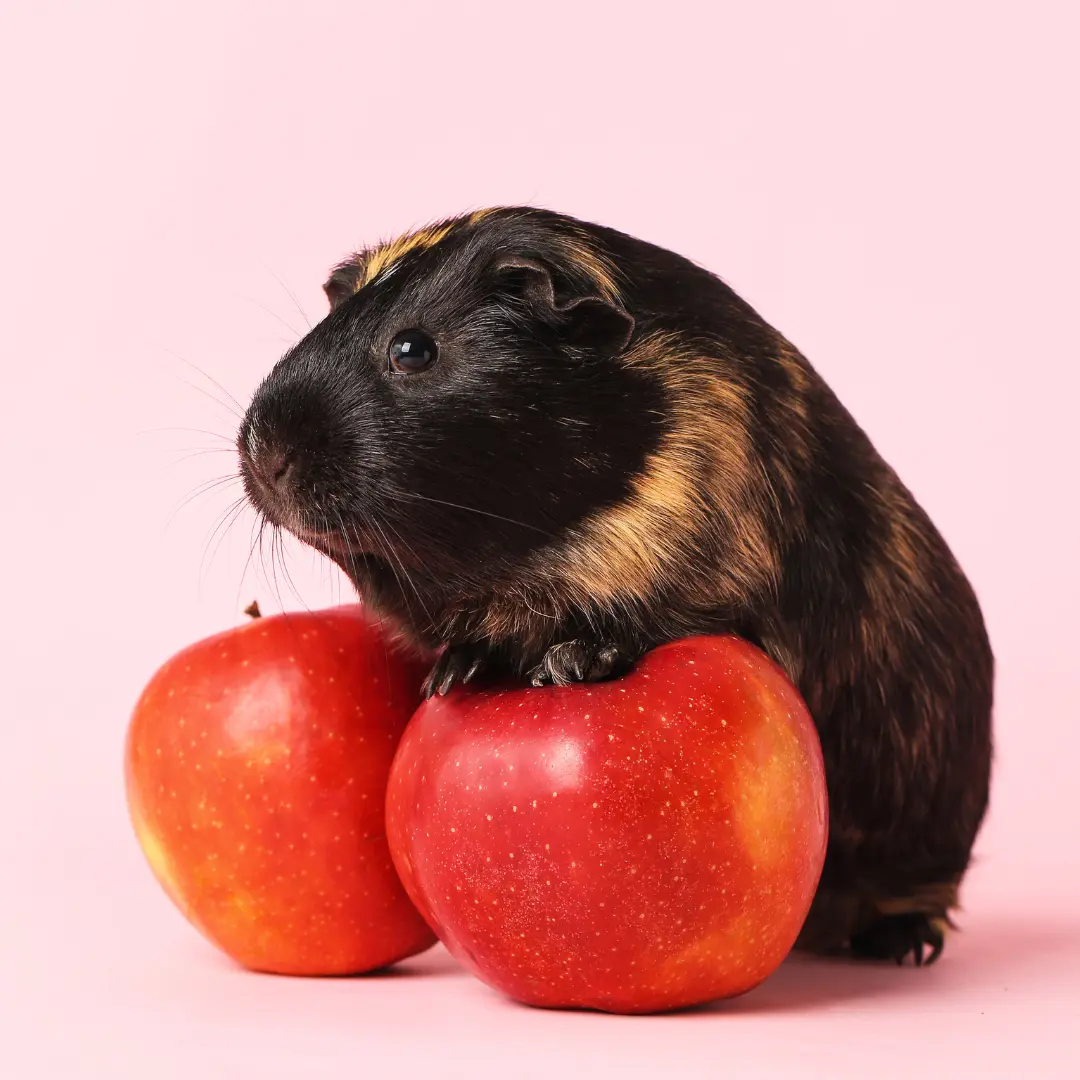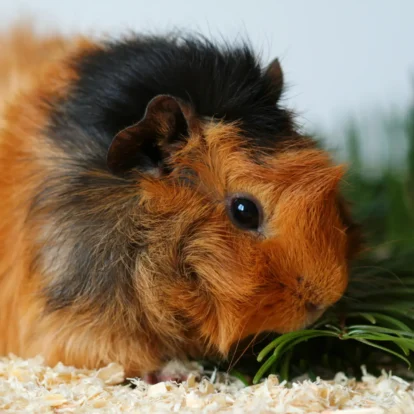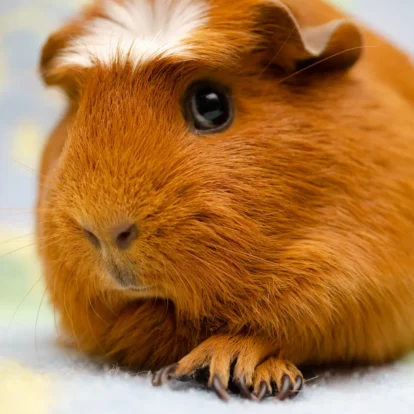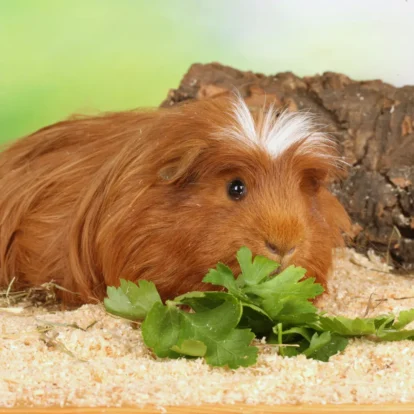Table of Contents
Introduction – Can Guinea Pigs Eat Apples?
Hello, fellow guinea pig parents! 🐹👋 Today, we’re going to dive into the juicy world of fruits, specifically apples, and answer the question many pet owners have: Can guinea pigs eat apples? 🍏🍎 For most guinea pigs, the allure of sweet treats can be too hard to resist. But, as responsible pet parents, we must ensure these little nibbles don’t harm our furry friends.
Apples are filled with various nutrients that can contribute to a guinea pig’s diet, from vitamins to fiber. However, when it comes to feeding them to your little piggie, there’s more to consider than just the nutritional value. Green apples 🍏, red apples 🍎, and everything in between can be a delicious occasional treat, but how they’re served is crucial. Are the peels safe? What about the cores and seeds? And how many apples are too many? 🤔
But let’s not forget that all guinea pigs have different tastes and preferences, despite the breed. Some may relish the new foods, while others might prefer their regular hay and vegetables mix.
In this post, we’ll explore the joys and potential downsides of incorporating apples into your guinea pig’s diet. We’ll answer all these questions and more, helping you determine if apples are good for your pet and how to offer them as healthy treats without triggering any health issues. 🍎🐹
So, whether you’re a seasoned guinea pig owner or a newbie, sit tight and get ready to discover all about guinea pigs and apples!
It’s apple-licious time, folks! 🍏🎉
What Nutrients Do Apples Contain?
Apples are a nutritional powerhouse packed with a host of beneficial nutrients that can positively impact your guinea pig’s health.
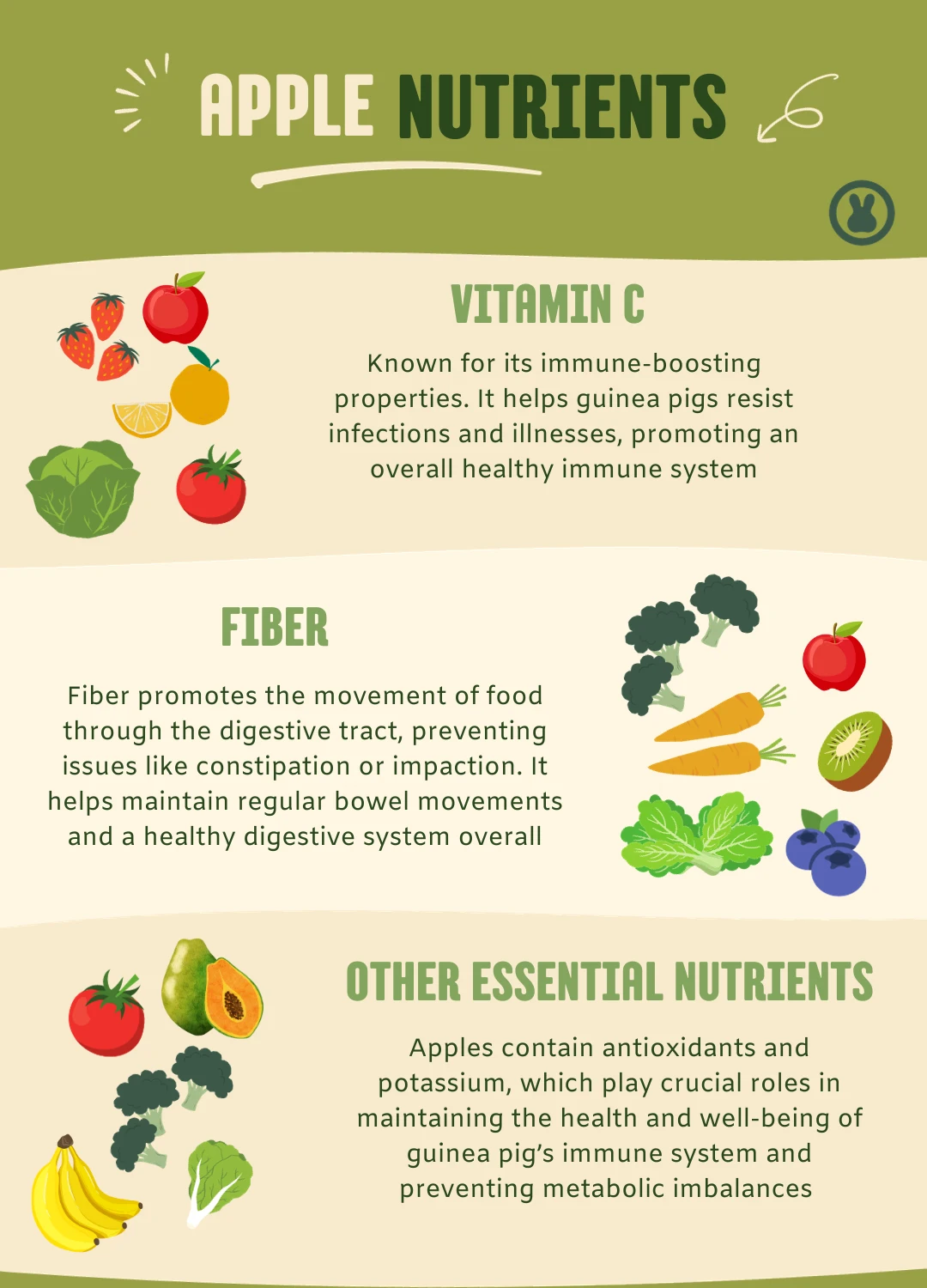
A single apple comes loaded with a rich blend of dietary fiber, vitamins such as vitamin C and vitamin A, and minerals like potassium and magnesium. These elements play a crucial role in maintaining the overall health of your guinea pig, ensuring they stay hale and hearty.
Let’s explore each of these nutrients and their benefits.
Vitamin C: The Immune Booster 🍊🌟
Apples are a fantastic source of Vitamin C, an essential nutrient we usually associate with citrus fruits, but it’s in our favorite crunchy delight, too! Like us humans, Guinea pigs cannot produce their own vitamin C, so incorporating it into their diet is essential.
Vitamin C boosts the immune system, helps produce collagen, and aids in repairing body tissues. So, a small portion of apples can contribute to your guinea pig’s vitamin C needs and keep them healthy and happy! 😊🐹🍎
Fiber: For a Happy Tummy! 🌾😃
Fiber is another valuable nutrient in apples. This is the stuff that keeps your guinea pig’s digestive system running smoothly. It aids in digestion, prevents constipation, and promotes overall gut health.
Plus, the crunch from a fresh apple also helps maintain their dental health. It’s like a toothbrush disguised as a yummy treat! 🍏🦷
Other Essential Nutrients: More Reasons Why Apples are Good 👍🍎
Aside from Vitamin C and fiber, apples contain other essential nutrients like potassium and antioxidants. Potassium helps regulate fluid balance, nerve signals, and muscle contractions, while antioxidants protect against cellular damage. Your pigs eat apples not just for their sweet and crisp taste but also for these benefits!
Like any other fruits, apples should be served fresh and never cooked. Cooked apples lose their nutrient value and can be challenging for small animals to digest.
Downsides of Apples for Guinea Pigs
While apples are indeed a yummy and healthy treat for our guinea pig buddies 🐹🍎, it’s crucial to remember that moderation is key. Like many fruits, apples have a relatively high sugar content. You might not think about it when you’re munching on a juicy apple, but for our small pets, even a little bit of sugar can be quite a lot! 🍬🍎
Too much sugar could lead to health issues like obesity and diabetes in guinea pigs. I once had a guinea pig, Sparkle ✨, an adorable American Guinea Pig who loved eating apples more than anything. I thought, “Why not? Apples are healthy!” Well, over time, Sparkle started to gain a significant amount of weight, and the vet said it was due to the sugar in the apples. 😔🍎
So, what’s the solution? Small amounts, my friends! 😊 Instead of giving your guinea pig a whole apple, try feeding them small pieces once or twice a week. This way, they can still enjoy their favorite treat and get the essential nutrients without the risk of consuming too much sugar.
My rule of thumb: small pieces, small amounts! 🍏🐹👍
Remember, our pets rely on us to keep them healthy, and sometimes that means limiting their favorite treats. 🐹💗🍎
To Peel or Not to Peel: Are Apple Skins Safe for Guinea Pigs?
It’s totally fine to leave the peel on! 🍏🍎 The skin of an apple actually holds a lot of its nutritional value. Vitamins A and C, dietary fiber, and antioxidants abound in apple skins. These nutrients contribute to maintaining our guinea pig’s overall health and keeping their tiny immune systems in tip-top shape! 😊
But there’s something else that makes apple skins particularly beneficial for our furry pals – the texture! The slightly rugged texture of apple peels can actually help keep our guinea pig’s teeth in check. Now, isn’t that something worth crunching on? 🐹💕
Now, here’s the catch: while apple peels are a great source of nutrients, they also tend to harbor pesticides ☢️. So make sure to wash the apple well before you feed it to your guinea pig! In fact, I make it a point to scrub the apple under running water for at least a minute before giving it to my piggies. 🍏💦
While apple skins are beneficial, they should only serve as a tiny piece of your guinea pig’s diet. They are a fruit treat, after all, and not a staple! 🍏🐹 Just think of it this way: tiny pieces, big benefits!
How to Safely Feed Apples to Your Guinea Pig
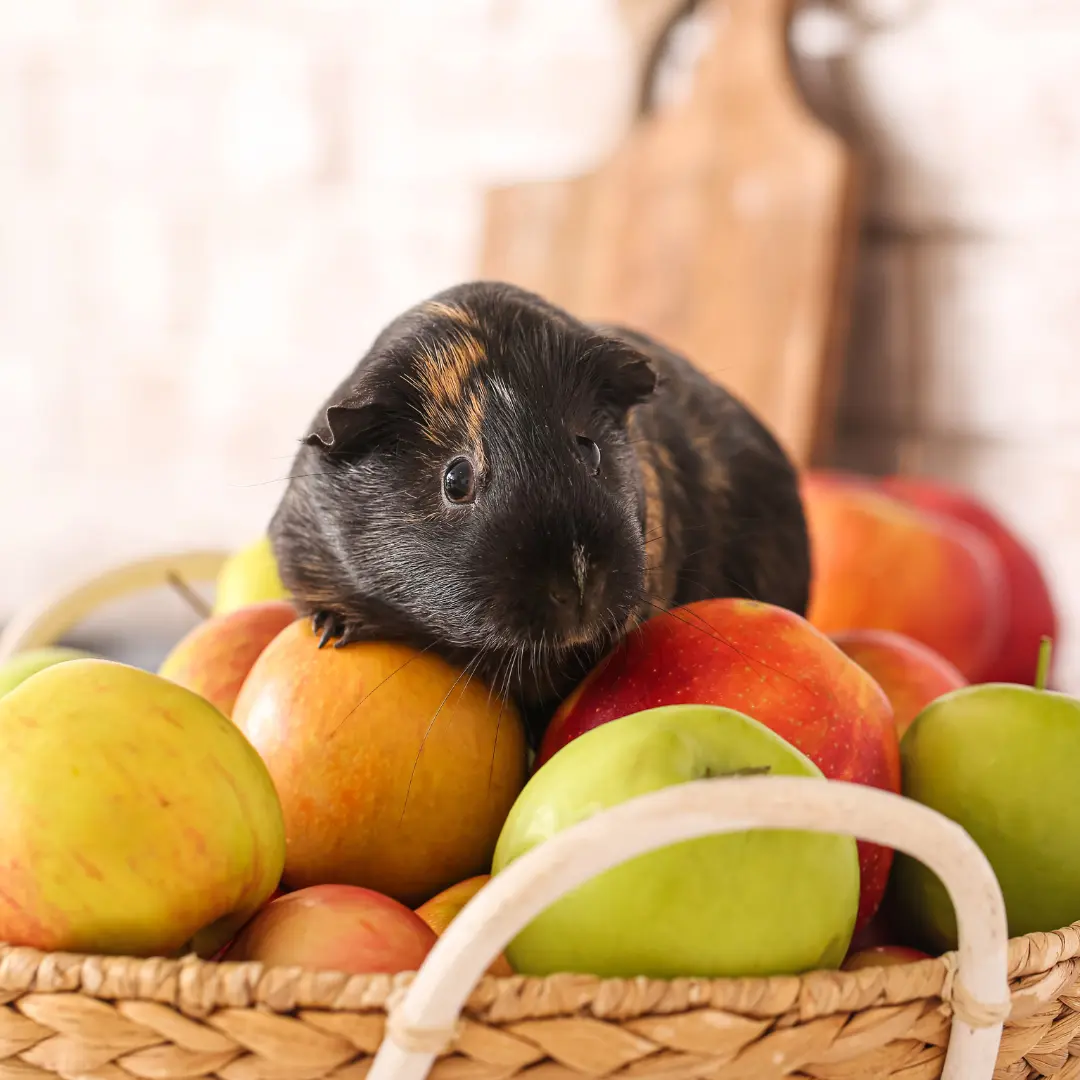
How Much Apple Should a Guinea Pig Eat?
A slice or two once or twice a week is fine. We want our piggies to relish their apples and get more nutrients from their daily leafy greens and hay diet. 🌿🐹
How About Apple Core and Seeds?
Nooo! 🚫 Seeds, in particular, are a big no-no! Apple seeds contain cyanide, which is toxic to guinea pigs.
As for the core, it can be a choking hazard. So, when my guinea pig eats apples, I make sure to remove both core and seeds meticulously. Safety first, right? 👍
My Tips on Preparation
Let me share with you my tips on preparing and feeding apples to your guinea pig:
- Fresh food is crucial. Make sure you get fresh fruit.
- Wash it carefully: I always rinse the apple under running water and scrub it enough to wash away any potential pesticides.
- Size Does Matter: Cut the apple slices into thin pieces to make it easier for your guinea pigs to handle and chew, reducing the risk of choking.
- Mix It Up: As well as mixing in other fruits like blueberries and strawberries, you can also consider adding a bit of their daily greens to the mix. This can make for a well-rounded, nutrient-packed treat.
- Safety Check: Always double-check to ensure all seeds and the core have been removed. Even one forgotten seed could be a danger due to the cyanide content.
- Temperature Matters: Serve the apple slices at room temperature. Guinea pigs can have sensitive tummies, and cold slices straight from the fridge might upset their digestive systems.
Remember, the more care you put into the preparation, the safer and more enjoyable the treat will be for your guinea pig. 🐹💚
Wrapping Up – Can Guinea Pigs Eat Apples?
So, to answer the question – can guinea pigs eat apples? Absolutely, yes! 🍏 My little furry friends adore the sweet crunch of a small piece of apple. It adds a refreshing variety to their diet, which should primarily consist of hay and leafy green vegetables for that essential guinea pig vitamin boost.
Just remember, everything is in moderation. Guinea pigs can eat apples, but not as a whole meal. 🐹 Adding a small piece to their meals or as a once-in-a-while treat creates a delightful surprise for your pet. Same thing happens with other fruits like grapes 🍇and watermelon 🍉.
The same goes for dried fruits – added portion sizes can be a fantastic treat, but they should never replace nutritional staples like spinach and other leafy greens. 🥬🍎
It’s all about balance and ensuring your guinea pigs eat a varied and nutritious diet. This way, you can enjoy the adorable sight of your guinea pigs munching happily on their food, knowing you’re doing the best for their health.
Always remember, happy and healthy guinea pigs are our ultimate goal! 🐹❤️

